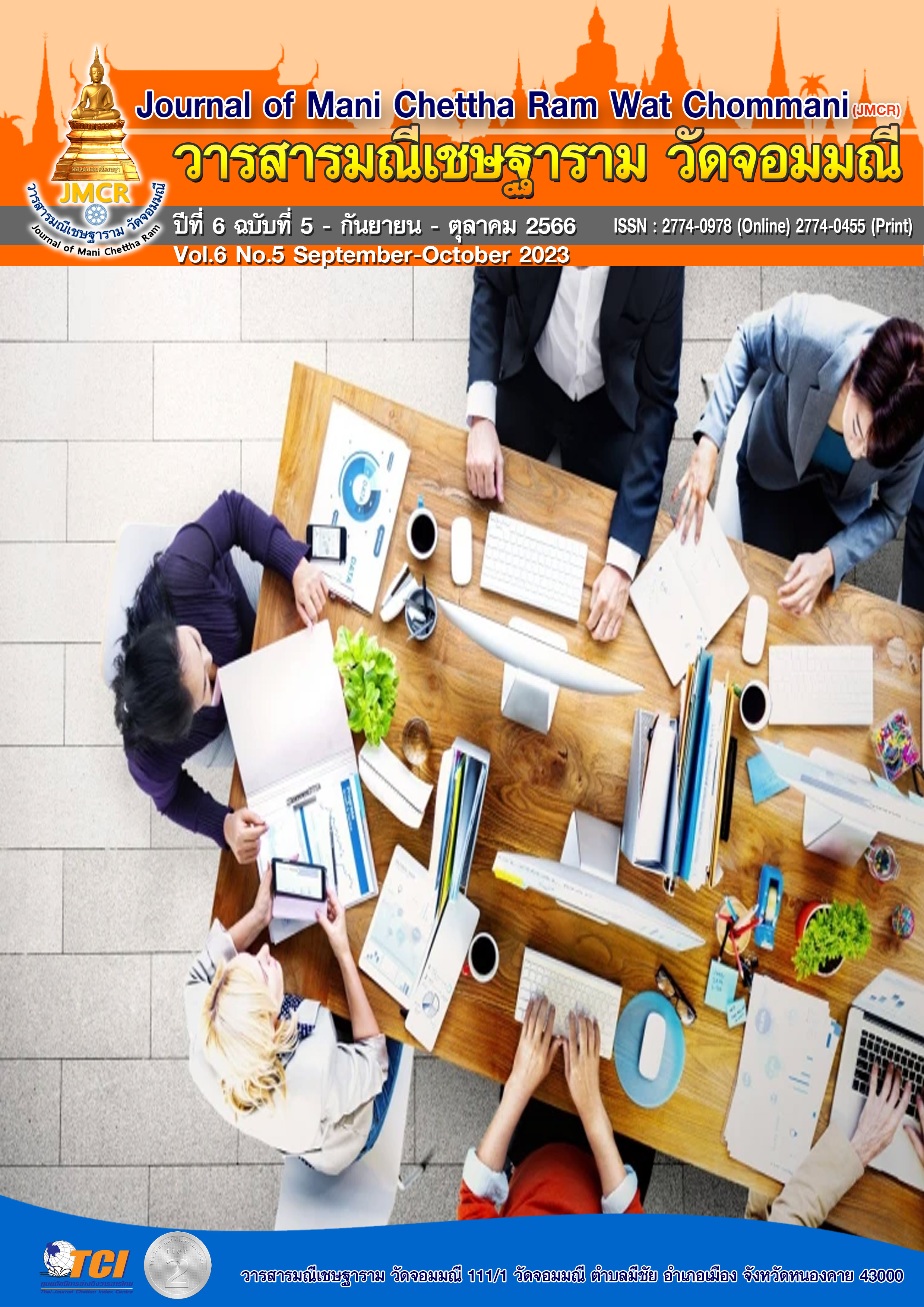The THE DEVELOPMENT OF ACADEMIC ACHICVEMENT UNDER HISTORY OF THAI LITERATURE AND MASTERPIECES (ED1020) USING LEARNING ACTIVITIES BASED ON RASEP MODEL FOR THE SECOND YEAR STUDENTS IN TEACHING THAI LANGUAGE PROGRAM
Keywords:
Thai literature, RASEP Model of learning management, Problem- solving SkillsAbstract
The objectives of this research are 1) to develop learning activities for the course ED1028, analyzing contemporary Thai literature; of 3rd year students. 2) To develop academic achievement in the course ED1028, analysis of contemporary Thai literature; of 3rd year students. 3) To study the opinions of third-year students in the Thai language teaching program, towards organizing learning activities using the RASEP Model together with problem-solving skills. The research format is action research with 3 action cycles. The sample group included 3rd year students in the Thai language teaching program 52 students/person. Research tools classified according to the nature of use 3 types: 1) tools used in practice experiments, 2) tools used to reflect on practice results, 3) tools used to evaluate the effectiveness of learning management. Statistics used in data analysis include mean, standard deviation, and percentage.
The results of the research are as follows: 1) Results of the development of learning activities by organizing learning activities according to the RASEP Model together with problem-solving skills. Founding that able to appropriately respond to the needs of the sample students and create a happy and stimulating learning atmosphere, 2) Results of the development of academic achievement of 3rd year students. The average score is 90.60%, which is higher than the specified criteria. 3) Third-year students in the Thai language teaching program have opinions on organizing learning activities using the RASEP Model along with problem-solving skills at the highest level.
References
กระทรวงศึกษาธิการ. (2561) พระราชบัญญัติการศึกษาแห่งชาติ พ.ศ. 2561. กรุงเทพมหานคร: สำนักงานคณะกรรมการการศึกษาแห่งชาติ สำนักนายกรัฐมนตรี.
ชัยวัฒน์ สุทธิรัตน์. (2561). 80 นวัตกรรมการจัดการเรียนรู้ที่เน้นผู้เรียนเป็นสำคัญ. (พิมพ์ครั้งที่ 8). นนทบุรี: พี บาลานซ์ดีไซด์แอนปริ้นติ้ง.
ดิเรก พรสีมา. (2559). ครูไทย 4.0 กระทรวงศึกษาธิการ. กรุงเทพมหานคร: สำนักปลัดกระทรวงกระทรวงศึกษาธิการ.
ราชกิจจานุเบกษา. (2542). พระราชบัญญัติการศึกษาแห่งชาติ พ.ศ. 2542. กรุงเทพมหานคร: สำนักงานคณะกรรมการการศึกษาแห่งชาติ สำนักนายกรัฐมนตรี.
วิจารณ์ พานิช. (2555). วิถีสร้างการเรียนรู้เพื่อศิษย์ในศตวรรษที่ 21. กรุงเทพมหานคร : มูลนิธิสดศรีสฤษดิ์วงศ์.
สุภาพร เตวิยะ. (2565). การจัดการเรียนรู้เชิงรุกเพื่อพัฒนาผลสัมฤทธิ์ทางการเรียนและความเชื่อมั่นในตนเองของนักศึกษาสาขาภาษาอังกฤษ คณะครุศาสตร์ มหาวิทยาลัยราชภัฏเชียงราย. วารสารวิชาการมหาวิทยาลัยราชภัฏศรีสะเกษ,16(1), 122 – 134.
สุวิทย์ มูลคำ. (2550). กลยุทธ์การสอนคิดวิเคราะห์. พิมพ์ครั้งที่ 4. กรุงเทพมหานคร: ภาพพิมพ์.
อภินันท์ นนฺทภาณี (คำหารพล) และคณะ. (2562). การพัฒนาผลสัมฤทธิ์ทางการเรียนโดยใช้การเรียนรู้เชิงรุก สาระหน้าที่พลเมืองของนักเรียนชั้นประถมศึกษาปีที่ 2 โรงเรียนเทศบาลวัดศาลามีชัย อำเภอเมือง จังหวัดนครศรีธรรมราช. วารสารมหาจุฬานาครทรรศน์, 6(3), 1148 – 1160.
อรรถพงษ์ ผิวเหลือง. (2565). การจัดการเรียนรู้แบบ RASEP Model. วารสารสังคมศาสตร์ปัญญาพัฒน์, 4(1),19 – 26.
อรรถพงษ์ ผิวเหลืองและพระครูวินัยธรวรชัด. (2564). รูปแบบการจัดการเรียนรู้ที่เน้นการเรียนรู้โดยการกระทำ. วารสารบัณฑิตศึกษามหาจุฬาขอนแก่น, 8(4), 21 – 30.
Dewey, John. (1950). How we Think. Lexington D.C.: Heath and Company.




